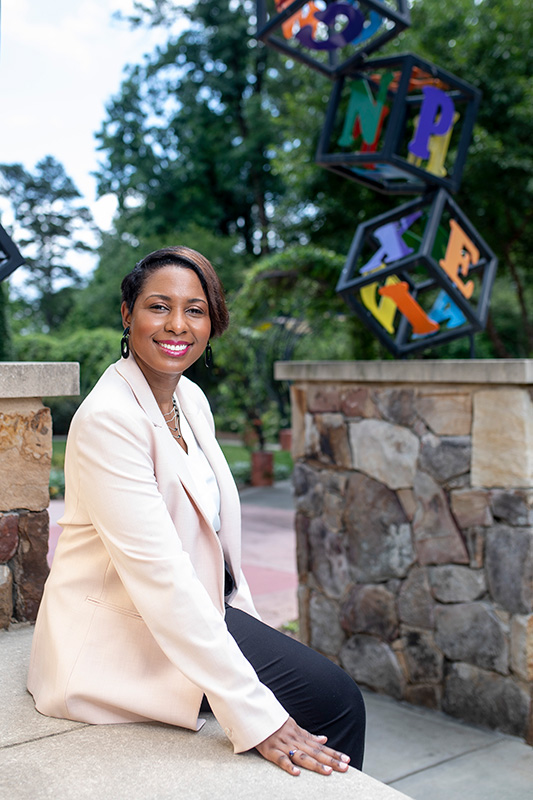Guilford, the third largest county in North Carolina, was the site of the 1960 Woolworth counter sit-in that helped spread the Civil Rights movement. Lying just outside the Research Triangle, which comprises North Carolina State University, Duke University and University of North Carolina at Chapel Hill, Guilford County also boasts seven colleges and universities within its 658 square miles. As a result, it attracts a wide range of highly educated professionals and executives.

“It’s a resource-rich region,” says Charrise Hart, “but access-poor. Not everyone who lives here has access to the opportunities they deserve and need.” As CEO of Ready for School, Ready for Life (Ready Ready), a collaborative effort to build a connected, innovative system of care for the county’s youngest children and their families, she leads a team that identifies and supports programs that have demonstrated success in the community.
Hart describes Ready Ready as a backbone organization — which means it plays a lead role in coordinating stakeholders and providing support and resources to multiple community organizations to achieve system-building goals for Guilford County. Sometimes it provides funding, but more often it facilitates foundation investments and community partnerships.
The scope isn’t limited to the academic factors that prepare children for kindergarten. “We also tackle systemic barriers that interfere with potential,” she says. Founded by J. Edward Kitchen of the Joseph M. Bryan Foundation and Susan S. Schwartz of the Cemala Foundation, Ready Ready is supported by The Duke Endowment, Blue Meridian Partners and numerous other funders. Schwartz and Kitchen express the hope that its strategies “can be emulated by others for the benefit of all children throughout our country.”
Hart knows Guilford County like the back of her hand, having grown up here. One summer, home from college and bored, she let her mother talk her into volunteering with a mentoring program for teen parents. “It was the most eye-opening experience I’ve ever had.”
Studying for her Masters in Social Work at UNC Chapel Hill, Hart knew she wanted to help women and families, but she didn’t necessarily see herself as a clinical social worker or therapist. A professor, Dan Hudgins, helped her see that her interest was more in the vein of systems change, and this guidance led to her pursuing an MBA at Wake Forest University. “I think back on those teen moms,” she says, “and see the correlation between teen pregnancy rates and multigenerational poverty more clearly. The individual decisions I saw up close – they fit in with broader patterns and systems.” She says her degrees in social work and business equip her to combat historic inequities with her heart and her head. Schwartz and Kitchen praise her “business mind, strategic vision, commitment to building a strong staff and passion for giving all children the opportunity to achieve their full potential.”
After trying out life in accounting in a corporate setting, Hart took a pay cut to work for the YWCA in Greensboro. Years later and 200 miles away at the YWCA in Wilmington, N.C., she helped lead a charge to increase the wages in the early learning center. “I looked at what these workers were making,” she says, “and I thought, ‘How can we call that wage, empowerment?’”
Hart returned home to Guilford County and took the helm of Ready Ready in 2019, just in time for Covid and the many challenges it has brought for the youngest and most vulnerable in the region. The pandemic has led to, among other shifts, extra attention to the mental health of children and their families, as well as the educators and professionals on the frontlines.
Pandemic or not, health is an evergreen factor in determining the school readiness of the 6,000 children born here every year. The disparities are wide, and solutions take a variety of forms. Hart points to projects with such national organizations as Healthy Steps (a ZERO TO THREE program) and Nurse Family Partnership. Ready Ready also partners with Family Connects, a nurse home visiting program organized in conjunction with county government, and it recently launched a pilot with the Children’s Home Society of North Carolina to embed health navigators in OB-Gyn and pediatric offices. “The medical professionals have just 15-20 minutes to do their job,” Hart explains. “The trained navigators have the time and expertise to explore more deeply how a family is doing and to make referrals if necessary.”
Navigation Supervisor Mary Connor-Hill says, “One of the greatest moments as a navigator is when we hear from the parents, and we get to celebrate with them in the birth of their child. When they send us newborn pictures, and they let us know how they are doing, and how helpful we were to them during their pregnancy.”
When it comes to early education, Hart is proud of her state’s record. “We are extremely committed to the well-being of our children,” she says, adding that its pre-K program is one of the strongest in the nation. Of course, she refuses to rest content with the status quo and draws strength from a robust regional and state network that includes:
- Smart Start, a public-private network that provides expertise, guidance and infrastructure to ensure that each child in each of North Carolina’s hundred counties receives the care and nurturing they need to thrive.
- The North Carolina Early Education Coalition, which works to ensure that all children have access to high-quality early care and learning experiences. One of its cardinal issues is seeing Leandro vs. North Carolina through to its objective. This 1997 state Supreme Court case should have set the state up for expanded funding for the early education of children from underserved and marginalized communities, but it is taking decades to find a way forward. (Read about a similar case in New Jersey.)
- Triangle Family Services, which promotes family safety, financial security and mental health. CEO Alice Lutz has been a mentor and inspiration to Hart.
- The United Way of Greater Greensboro. Hart counts Michelle Gethers-Clark, who recently left the United Way to become chief diversity officer at Visa, as another mentor.
Hart credits the Ready Ready staff and board for setting her up for success, but above all for embracing her inclination to listen to parents like Sanaa Sharrieff and the rest of the Guilford Parent Leader Network, which was formed to ensure that family voice is brought into every key decision made by the organization.
“Having our voices heard as parents, having our voices heard as members of the community, and learning how to navigate the space that we’re in right now while still being effective parents plus all the resources have been phenomenal,” Sharrieff says. “When I open my mouth for a discussion, I know what I say will be considered and it may even be implemented. And that’s an awesome feeling.”
Hart concurs, saying that Ready Ready has a vision—“but it’s not my vision, it’s the vision of the community.”

Mark Swartz
Mark Swartz writes about efforts to improve early care and education as well as developments in the U.S. care economy. He lives in Maryland.



